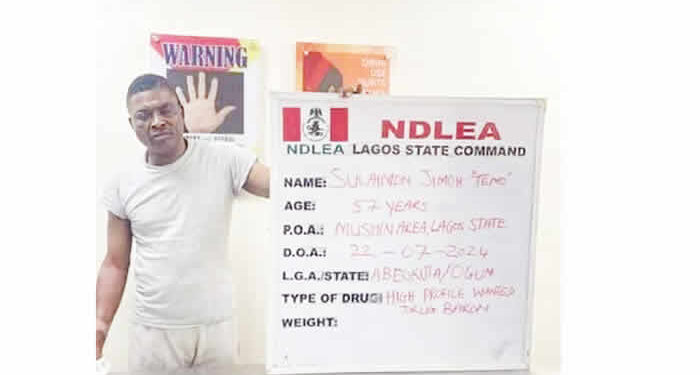On October 3, 2024, in a significant development within the Nigerian judiciary, the Federal High Court in Lagos heard compelling testimony regarding a substantial drug seizure involving 704 kilograms of marijuana. This testimony was delivered by Superintendent Hussaini Gusau, an operative of the National Drug Law Enforcement Agency (NDLEA), during the trial of Jimoh Suleimon, known by his alias ‘Temo’. The case highlights the ongoing battle against drug trafficking in Nigeria and the complexities surrounding law enforcement efforts.
Superintendent Gusau detailed the circumstances surrounding the arrest made in 2020, which ultimately linked Suleimon to the illicit drug trade. During his testimony, he recounted how he had received intelligence about individuals unloading goods from a boat into a truck. Acting on this information, he alerted his commander, and together with his team from the Apapa Special Area Marine Unit, they rushed to the scene. However, upon their arrival, the suspects had nearly completed their operation.
Gusau described the tense moment when law enforcement officials blocked the exit of three vehicles involved in the operation: a white truck, a Sienna space car, and a Camry. As the suspects attempted to flee, six individuals were apprehended. The truck driver, Udoka Felix, claimed ignorance of the cargo’s contents, stating that he had been hired by one of the suspects, Ayambele, who pointed to another individual, Wasiu, as the owner of the cargo. When the truck was finally opened, it revealed a load of dry cannabis, which was suspected to be marijuana.
The defense attorney, Benson Ndakara, attempted to undermine the prosecution’s case during cross-examination. Gusau admitted that Suleimon was not present during the arrest and had no prior acquaintance with him. Furthermore, it was confirmed that Suleimon did not sign any of the evidence presented in court.

Adding to the prosecution’s case was Mrs. Patricia Afolabi, a forensic analyst with the NDLEA, who provided expert testimony regarding the seized substance. After conducting tests on a sample of the dry weed, Afolabi confirmed that it tested positive for marijuana. However, she too faced scrutiny during cross-examination, revealing that Suleimon had not signed any of the related documents and that she was unaware of the sample’s origin.
The court proceedings led to an adjournment, with the next hearing scheduled for October 4, 2024. During the arraignment, Suleimon faced six amended charges, including being part of a drug trafficking organization and engaging in the importation, processing, and trafficking of cannabis. The NDLEA alleged that Suleimon, along with several accomplices—some of whom are currently at large—operated a drug trafficking network between Nigeria and Ghana from 2020 to 2024.
The charges filed against Suleimon contravene several sections of the National Drug Law Enforcement Agency Act, specifically those addressing drug trafficking and related offenses. Despite the serious allegations, Suleimon, also known as Olowoidigede and Godfather, has denied any wrongdoing and pleaded not guilty to all charges.
This case not only underscores the NDLEA’s ongoing efforts to combat drug trafficking in Nigeria but also highlights the complexities of prosecuting such cases, especially when it involves organized crime networks. As the trial continues, the outcome may have significant implications for the enforcement of drug laws in the country and the broader fight against drug-related crimes.
Post Views: 457









